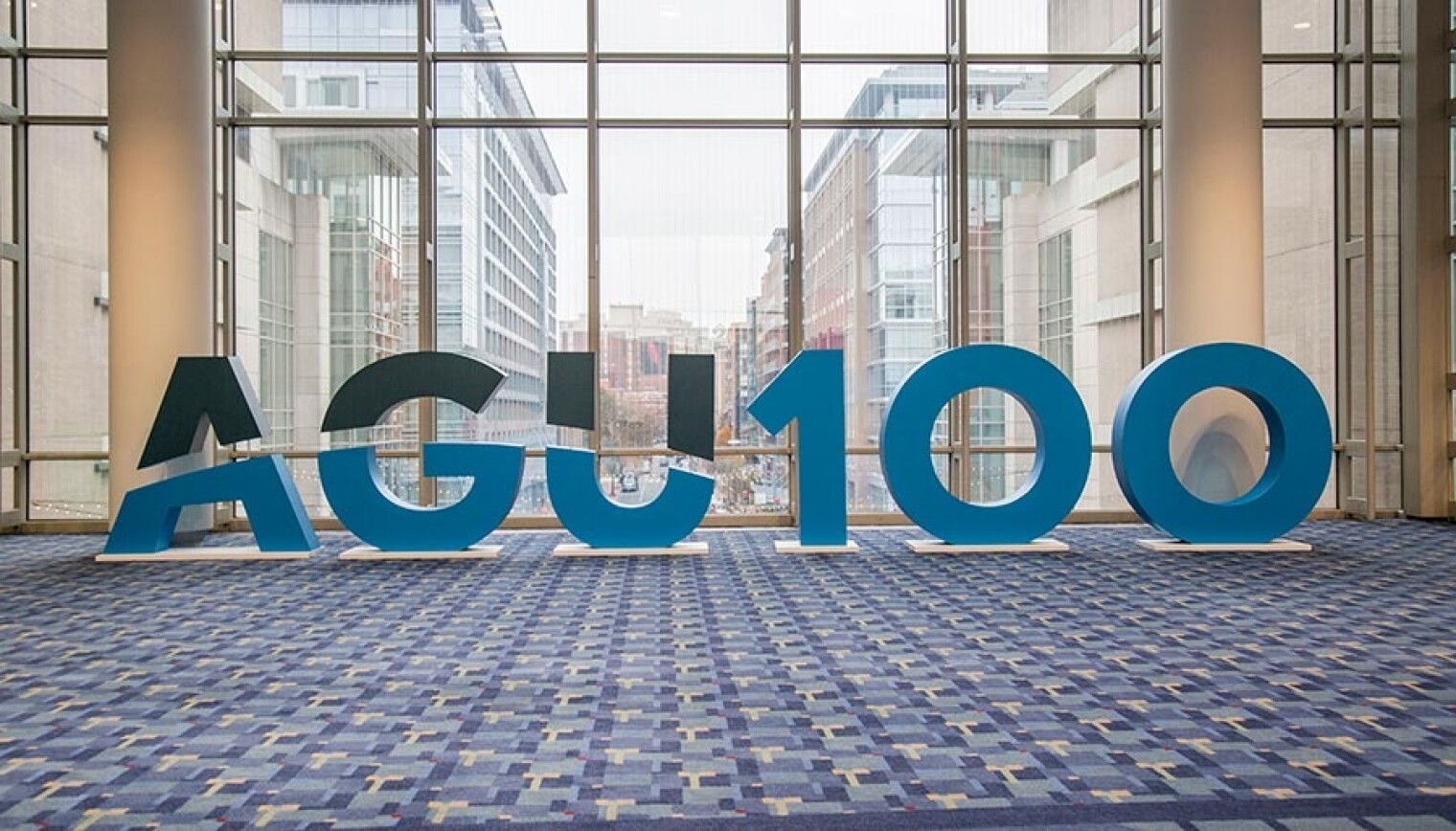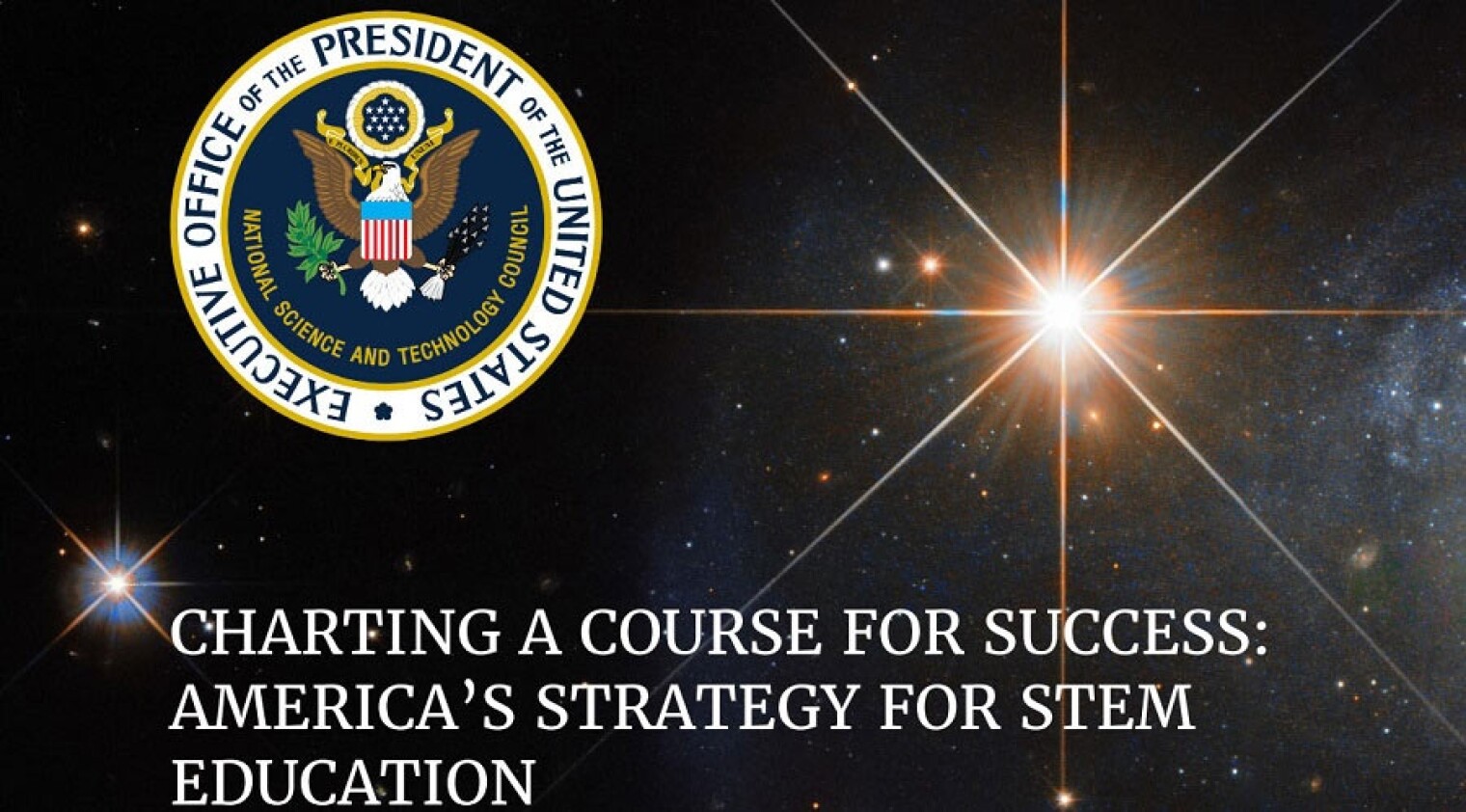| |
What’s Ahead
 |
| (Image courtesy of the American Geophysical Union) |
Science Policy in Spotlight at AGU Meeting in DC
Thousands of scientists are converging in Washington, D.C., this week for the American Geophysical Union’s annual meeting, which marks the beginning of the society’s yearlong 100th-anniversary celebration. Many events at the meeting are focused on science policy, including several keynote and centennial sessions, some of which will be webcast. The scientific program has many policy-focused sessions as well, including panel discussions with authors of the Fourth National Climate Assessment and Second State of the Carbon Cycle Report. In addition, there will be town hall events for a number of federal programs and planning efforts, including a session on preparations for the upcoming decadal surveys for planetary science and astronomy and astrophysics. AGU will also be honoring Sens. Gary Peters (D-MI) and Cory Gardner (R-CO) for their bipartisan efforts to pass the American Innovation and Competitiveness Act, though some AGU members have argued that Gardner should not be honored due to the positions he has taken on climate science.
Foreign Influence Task Force To Brief NIH Director
The co-chairs of the National Institutes of Health’s Foreign Influences on Research Integrity Working Group will update agency leaders on their work at an advisory committee meeting this Thursday. NIH Director Francis Collins established the panel in August to address concerns about researchers not reporting resource contributions from foreign organizations, “diversion” of intellectual property, and breaches of the integrity of the peer review process. Its website states that some foreign governments have “mounted systematic programs to unduly influence and capitalize on” NIH-supported research. It explains that these efforts have “typically taken the form of providing generous monetary support to targeted investigators, allowing them to conduct research either in U.S.-based laboratories or in foreign-based laboratories, but with expectations that the foreign entity will benefit.” While acknowledging that such arrangements are not necessarily prohibited, it states that “the potential for breaches of long-standing NIH policies and principles is significant.” Later in the meeting, NIH officials will discuss the agency’s efforts to combat sexual harassment and hear updates from other working groups focused on high-risk, high-reward research and supporting early-career researchers.
Judiciary Committee to Examine ‘Non-Traditional’ Espionage
On Wednesday, the Senate Judiciary Committee is holding a hearing to discuss China’s use of “non-traditional” espionage tactics. The hearing was originally scheduled for Dec. 5 but was postponed due to the death of former President George H.W. Bush. Among the six witnesses who will testify is John Demers, the head of the Justice Department’s recently launched Chinese counterespionage initiative, which is developing an “enforcement strategy concerning non-traditional collectors (e.g., researchers in labs, universities, and the defense industrial base) that are being co-opted into transferring technology contrary to U.S. interests.” Another witness is the head of the FBI’s counterintelligence division, Bill Priestap, who has led the bureau’s efforts to raise awareness about exploitation of research institutions by foreign actors, particularly China. U.S. universities have been seeking clarification on the nature of these concerns.
Ocean Technology and Nuclear Fuel Bills Set for House Votes
This week, the House is scheduled to vote on an amended version of the Senate’s “Commercial Engagement Through Ocean Technology (CENOTE) Act,” which directs the National Oceanic and Atmospheric Administration to coordinate its research, assessment, and acquisition of unmanned maritime systems with the Navy and the academic and private sectors. The Senate passed the bill by unanimous consent in August and would have to pass the amended bill before it could go to the president. The House will also vote on the “Advanced Nuclear Fuel Availability Act,” which directs the Department of Energy to support the availability of High Assay Low Enriched Uranium fuel for commercial applications. The bill aims to support the development of advanced nuclear reactors that require such fuel, which contains a higher proportion of uranium-235 than fuel used in current commercial reactors. The Senate has not yet considered the legislation.
|
|
In Case You Missed It
 |
| (Image credit - White House) |
White House Releases STEM Education Strategy
On Dec. 4, the Trump administration released a five-year strategic plan for federal STEM education programs. The congressionally mandated report calls for expanding work-based learning opportunities, increasing engagement of underrepresented groups in STEM fields, and fostering STEM literacy across the entire U.S. population, with a focus on computational and mathematical skills. The report places a particular emphasis on building “education-employer partnerships,” calling for more federal funding opportunities to “explicitly include the use of work-based learning partnerships as an award selection criterion.” Coincident with the report’s release, the National Science Foundation announced it will partner with four other federal science agencies as it establishes a “national network” of STEM diversity initiatives through its INCLUDES program.
Stopgap Measure Funds Federal Agencies Until Dec. 21
On Dec. 6, Congress passed a continuing resolution that extends current funding levels through Dec. 21 for federal agencies lacking final appropriations for fiscal year 2019. President Trump signed the bill before a previous stopgap spending measure expired on Dec. 7. Congress and the White House reached quick agreement on the measure to accommodate events commemorating the death of former President George H. W. Bush. President Trump is meeting with House Minority Leader Nancy Pelosi (D-CA) and Senate Minority Leader Chuck Schumer (D-NY) on Tuesday to negotiate a deal to keep the government open after the new stopgap expires.
Report Urges Preparations for Post-Quantum Cryptography
The National Academies released a report on Dec. 4 that assesses the prospects for building practical quantum computers. Sponsored by the Office of the Director of National Intelligence, the report focuses on the construction of devices capable of rendering current cryptographic methods obsolete. Reviewing known barriers to progress, the report finds “it is still too early to be able to predict the time horizon for a scalable quantum computer” but that it is “highly unexpected” one capable of defeating current cryptosystems will be built in the next decade. Nevertheless, observing that the development and implementation of quantum algorithms presents a formidable challenge, the report finds that “prioritization of the development, standardization, and deployment of post-quantum cryptography is critical for minimizing the chance of a potential security and privacy disaster.”
NIST Proposes Updates to Tech Transfer Policies
The National Institute of Standards and Technology released a draft “green paper” last week outlining 15 steps for improving the commercialization of federally funded R&D. NIST produced the paper as part of its Return on Investment initiative and the agency’s role in implementing the Lab-to-Market goal in the President’s Management Agenda. Among the proposals are: authorizing new mechanisms for working with the private sector, establishing technology entrepreneurship programs at federal agencies, creating new data portals for federal intellectual property and R&D assets, and developing government-wide guidance on metrics for R&D outcomes and impacts. Public comments on the paper will be accepted through Jan. 9, 2019. NIST plans to publish a final version in early 2019.
China Joins Open Access Push
According to a report in Nature, a representative of China’s National Science and Technology Library indicated last week that the Chinese government supports a European-led open access (OA) publishing initiative, known as Plan S. China now joins 13 European science funding agencies in pledging to require research they fund to be published in OA journals. Although it is unclear if China intends to commit to the Plan S implementation principles, China’s endorsement of the plan’s underlying goal represents a major boost for the OA movement. Backers of the plan have also encouraged U.S. science funding agencies to sign on, although to date only the Bill and Melinda Gates Foundation has done so.
Fusion R&D Panel Receives Strategic Planning Charge
The Department of Energy’s Office of Fusion Energy Sciences has begun a new long-range strategic planning activity that will cover its entire portfolio, which spans both fundamental plasma science and efforts directed toward generating energy from burning plasmas. DOE has tasked its Fusion Energy Sciences Advisory Committee (FESAC) with making recommendations on priorities for investment over a 10-year period under three scenarios of budget growth, with the fiscal year 2019 enacted budget of $564 million as the baseline. All three assume the U.S. continues to contribute to the ITER fusion project over this period. DOE has asked FESAC to hold off on establishing a study committee to first allow the American Physical Society’s Division of Plasma Physics to solicit broad input from the community. The charge letter states this two-phase approach is similar to those employed in long-range planning exercises conducted by the high energy physics and nuclear physics research communities.
National Center for Atmospheric Research Selects New Director
On Dec. 7, the National Center for Atmospheric Research (NCAR) named Everette Joseph as its new director. Joseph is currently the director of the Atmospheric Sciences Research Center at the University at Albany and co-leads the New York State Center of Excellence for the Weather Enterprise and a $30 million mesonet for advanced weather detection. The trustees of the University Corporation for Atmospheric Research, which operates NCAR on behalf of the National Science Foundation, unanimously approved Joseph’s appointment.
Universities Seek Extension of Export Control Rulemaking Input Period
Four major university associations have asked the Commerce Department to extend the public comment period for its notice of proposed rulemaking on establishing new export controls for “emerging technologies.” The department is assessing whether it can establish export controls on specific technologies within 14 emerging technology areas without harming U.S. leadership in science and engineering. The list includes a range of advanced computing, manufacturing, and sensing technologies. The university letter states that the current 30-day comment period, which ends on Dec. 19, “will unduly constrain the public’s and our universities’ ability to provide meaningful input on this very complex and technical, but very important topic.”
|
|
Events This Week
Monday, December 10 AGU: Fall meeting (continues through Friday)
Washington Convention Center (801 Mount Vernon Place NW, DC)
NASA: Advisory Council Meeting (continues Tuesday)
1:30 - 6:00 pm, Mon; 9:00 am - 12:00 pm, Tue
NASA headquarters (300 E St. SW, DC)
Webcast available
|
|
Opportunities Plasma Science Decadal Survey Issues Call for White Papers
The National Academies has issued a call for white papers from both U.S. and international researchers to inform a decadal survey of plasma science that launched in October. Known as Plasma 2020, the study will assess recent progress in the field and identify promising avenues for research in the coming ten years. The study committee anticipates the white papers will be a major source of input. Submissions are due by Feb. 15, 2019.
NOAA Seeking Input on R&D Plan
The National Oceanic and Atmospheric Administration is accepting comments to inform its forthcoming R&D plan, set for release in 2019. The proposed “key vision statement areas” of the plan are “reduced societal impacts from severe weather and other environmental phenomena; sustainable use of ocean and coastal resources; and a robust and effective research, development, and transition enterprise.” The agency seeks input on the proposed vision statements and other aspects of the document’s structure. Comments are due by Feb. 8, 2019.
AGU Hiring Public Affairs Analyst
The American Geophysical Union is accepting applications for a public affairs analyst position. The analyst will engage AGU members in science policy activities, produce materials for the society’s website, and help respond to requests for information from Capitol Hill and the media. Applicants must have a bachelor’s degree in political science, public policy, or a science discipline and four years of experience.
Know of an upcoming science policy opportunity? Email us at fyi@aip.org.Know of an upcoming science policy event? Email us at fyi@aip.org.
|
|
Around the Web
News and views currently in circulation. Links do not imply endorsement.
White House
Congress
Political Engagement
Science, Society, and the Economy
Education and Workforce
Research Management
Labs and Facilities
Energy
Quantum Science and Technology
Space
Weather, Climate, and Environment
Defense
Biomedical
International Affairs
|
|
|
| |
| |
|
